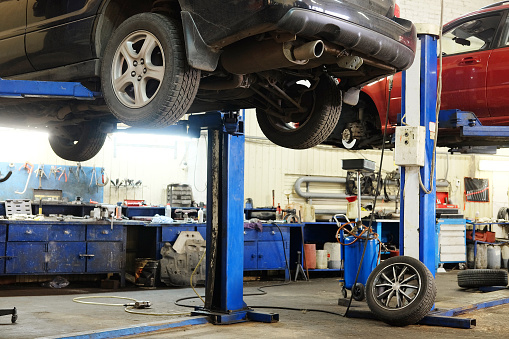All Categories
Featured
Your vehicle is a crucial part of your life, and taking good treatment of it makes sure that it offers you reliably for several years ahead. While contemporary cars are designed to be durable, overlooking proper maintenance can result in unnecessary breakdowns and expensive repair work. Below's just how you can maintain your automobile running longer and in peak condition.
- Comply With Regular Upkeep. The structure of a lasting automobile is regular maintenance. Follow your producer's suggested upkeep schedule, which can usually be discovered in your car's proprietor's guidebook. Routine tasks like oil modifications, tire turnings, and brake checks prevent wear and tear and keep your car executing optimally.
Overlooking oil adjustments is just one of the quickest methods to harm your engine. Clean oil makes sure appropriate lubrication and protects against overheating. Depending on your vehicle and driving behaviors, oil adjustments are generally required every 3,000 to 5,000 miles or as specified by the producer.
- Inspect and Renew Fluids. Your cars and truck relies upon numerous fluids to run efficiently. These include engine oil, transmission liquid, coolant, brake liquid, and power steering fluid. Reduced or filthy fluids can lead to engine overheating, sliding gears, and brake failure.
Make it a practice to examine fluid levels frequently. If you notice a considerable decrease in liquid levels, it may indicate a leak that requires immediate attention. Maintaining liquids tidy and at the appropriate degrees ensures your automobile runs successfully and avoids pricey repairs.
- Maintain an Eye on Your Tires. Tire upkeep is critical for both safety and performance. Improperly inflated tires can decrease gas effectiveness, cause unequal wear, and increase the danger of blowouts. Inspect your tire stress regular monthly and ensure it matches the supplier's recommendations.
Turning your tires every 5,000 to 7,500 miles advertises also use and prolongs their lifespan. Furthermore, check your tires for any kind of indicators of damages, such as cuts, protrudes, or reduced step deepness, and change them when necessary.
- Change Worn Components on schedule. Neglecting worn-out parts can lead to larger issues down the road. For instance, stopping working to change a worn timing belt can lead to engine failure. Likewise, worn brake pads can damage blades, causing pricey repair work.
Be proactive concerning replacing components such as stimulate plugs, filters, and belts based on the manufacturer's guidelines. Making use of top notch substitute components makes certain much better performance and longevity.
- Exercise Gentle Driving. The means you drive significantly influences the life-span of your vehicle. Hostile driving routines, such as fast velocity, abrupt stopping, and hard cornering, placed extra anxiety on the engine, brakes, and tires.
Rather, take on smooth driving strategies. Increase gradually, preserve a stable speed, and brake delicately whenever feasible. This lowers damage on your auto's elements and boosts fuel effectiveness.

- Shield Your Cars and truck's Exterior. Maintaining your cars and truck tidy isn't just about looks-- it's regarding protecting against damages. Dirt, road salt, and gunk can trigger corrosion and corrosion, particularly in the undercarriage. Regular washing, especially throughout winter months or after driving on salted roadways, is vital.
Waxing your vehicle every couple of months provides a protective layer versus ecological damages. Furthermore, park your car in a garage or use an automobile cover to shield it from severe climate and UV rays, which can fade the paint and damages the interior.
- Don't Overlook Warning Indications. Dashboard caution lights are your vehicle's method of informing you something needs focus. Whether it's the check engine light, low oil pressure, or tire pressure warning, addressing these notifies quickly can avoid minor issues from coming to be major fixings.
If you notice unusual noises, resonances, or changes in your auto's performance, don't ignore them. A specialist technician can diagnose and repair the problem prior to it intensifies.
- Shop Your Automobile Properly. If you're not utilizing your automobile for a prolonged period, proper storage is key. Keep your vehicle in a great, completely dry area to secure it from weather damage. Utilize a battery tender to maintain the battery charge and add a gas stabilizer to stop the gas from degrading.

Beginning the automobile periodically or taking it for a short drive can keep all systems in functioning order and prevent parts from confiscating up.
Verdict: Consistency Is Trick. Keeping your car running longer does not need challenging measures-- just consistency and focus to detail. Normal maintenance, mild driving routines, and dealing with issues immediately can make all the difference. Treat your auto with treatment, and it will certainly compensate you with reliability, far better efficiency, and years of trustworthy service. Bear in mind, a well-kept auto isn't just an automobile-- it's assurance on every trip.
Latest Posts
Flooring Professionals Who Treat You Like Family Members
Customized Wide Range Monitoring with WyHy Federal Cooperative Credit Union
Emergency Situation Roof Covering Repair Work-- Stopping Leakages in Their Tracks
More
Latest Posts
Flooring Professionals Who Treat You Like Family Members
Customized Wide Range Monitoring with WyHy Federal Cooperative Credit Union
Emergency Situation Roof Covering Repair Work-- Stopping Leakages in Their Tracks
